Jacksonville, FL Pollen and Allergy Report for Summer 2023
Pollen Allergy Trends in Jacksonville, FL
When is pollen lowest in Jacksonville, FL?

May
Lowest month total PPM
Avg. PPM
When is pollen highest in Jacksonville, FL?

April
Highest month total PPM
Avg. PPM
How does pollen in Jacksonville, FL compare to Florida?
Jacksonville has a lower average PPM than the state of Florida.
Jacksonville yearly avg PPM:
Florida yearly avg PPM:
How does pollen in Jacksonville, FL compare to the USA?
Jacksonville has a higher average PPM than the USA.
Jacksonville yearly avg PPM:
USA yearly avg PPM:
Is pollen worse this year in Jacksonville, FL?
Spring 2023 was better than spring 2022.
Spring 2023 PPM:
Spring 2022 PPM:
Average PPM in Jacksonville, FL
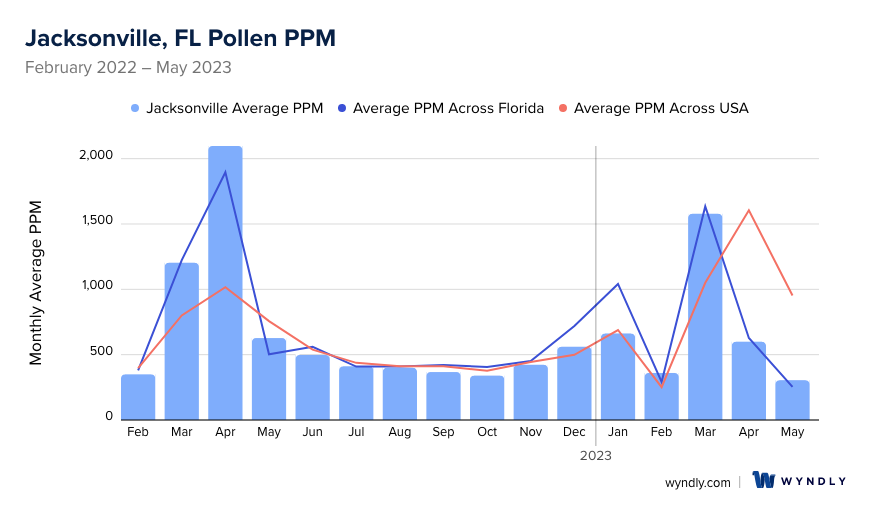
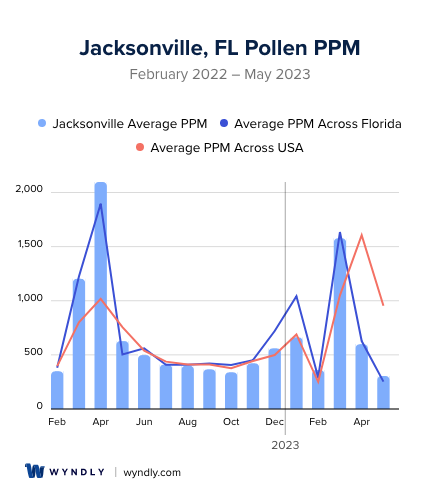
Jacksonville, FL Pollen and Allergy Breakdown by Month
Grass
When is grass pollen highest in Jacksonville, FL?
April has the highest grass pollen in Jacksonville, FL with an average PPM of
When is grass pollen lowest in Jacksonville, FL?
December has the lowest grass pollen in Jacksonville, FL with an average PPM of
Tree
When is tree pollen highest in Jacksonville, FL?
March has the highest tree pollen in Jacksonville, FL with an average PPM of
When is tree pollen lowest in Jacksonville, FL?
September has the lowest tree pollen in Jacksonville, FL with an average PPM of
Weed
When is weed pollen highest in Jacksonville, FL?
April has the highest weed pollen in Jacksonville, FL with an average PPM of
When is weed pollen lowest in Jacksonville, FL?
February has the lowest weed pollen in Jacksonville, FL with an average PPM of
Jacksonville, FL Pollen Monthly Breakdown by Pollen Type
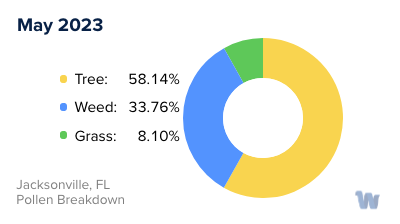
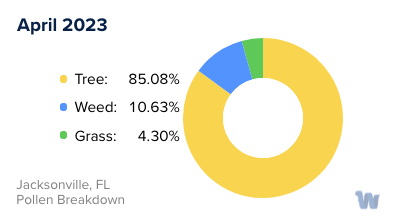

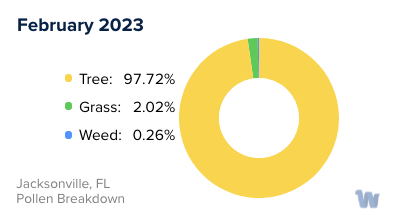
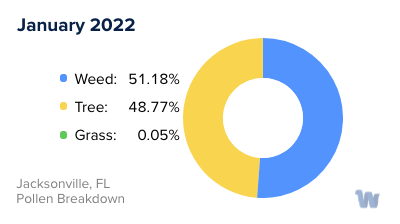
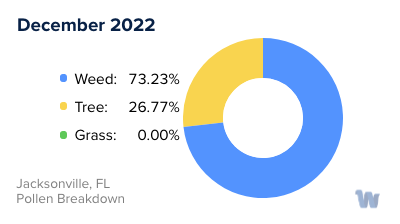
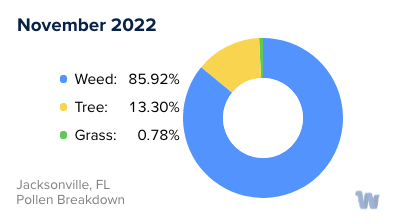
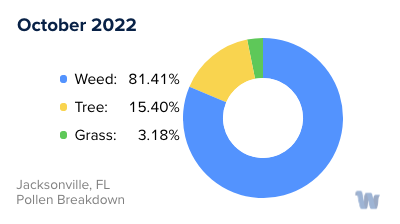
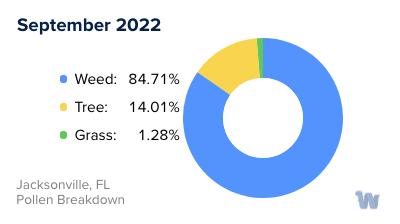
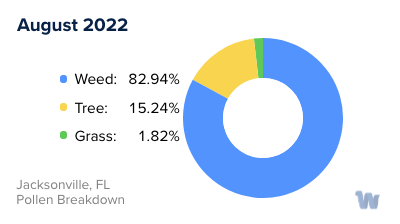
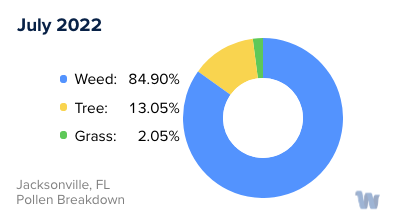
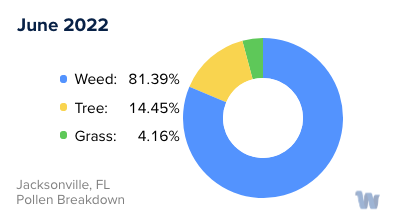
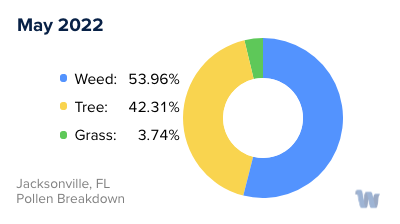
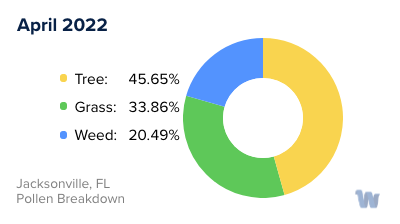
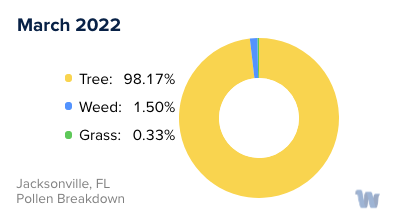
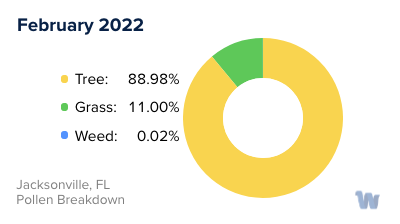
Pollen and Hay Fever in Jacksonville, FL
As the warm months set in, residents of Jacksonville, Florida may notice a rise in sneezing, itchy eyes, or a runny nose. These symptoms could be the result of pollen allergies, often referred to as hay fever.
Pollen, a fine powder released by plants for fertilization, often becomes airborne and can cause allergic reactions in some individuals. In Jacksonville, there are three main types of pollen that can trigger these allergies: tree pollen, grass pollen, and weed pollen.
Tree pollen is typically the first to appear as we welcome spring in Jacksonville, usually between February and May. Oak, pine, and cedar are among the most prevalent tree pollens in the area. These trees release large amounts of pollen that can travel for miles, making them a common culprit for early-season allergies.
Grass pollen tends to follow tree pollen and usually peaks in late spring and early summer. Bermuda grass, Bahia grass, and Timothy grass are common in Jacksonville and can cause significant hay fever symptoms. They typically release pollen from May to July.
Weed pollen, on the other hand, is most prevalent in the late summer and fall. The usual suspects in Jacksonville include ragweed, sagebrush, and pigweed. These weeds release their pollen into the air, particularly from August to November, marking the last wave of the pollen allergy season.
It's important to note that specific pollen levels can vary from year to year and are influenced by factors such as temperature, rainfall, and wind conditions. Therefore, the timing of these pollen seasons may shift slightly.
Pollen allergies can significantly affect your quality of life, making it crucial to recognize the types of pollen and their peak seasons. Understanding these factors can help you anticipate when you might experience symptoms and take appropriate steps to reduce your exposure, allowing you to fully enjoy the beautiful city of Jacksonville throughout the year.

